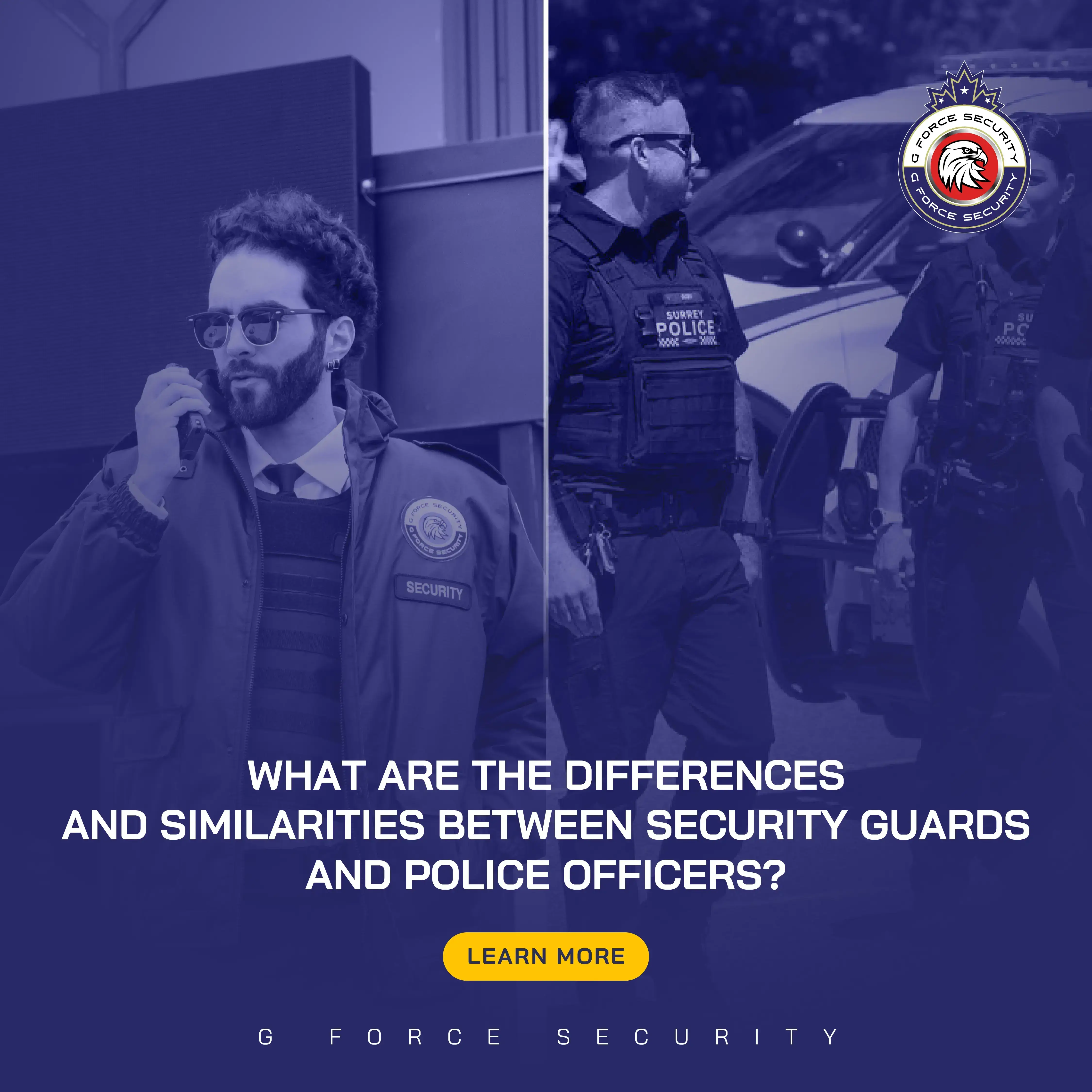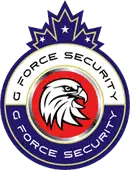The roles of security guards and police officers are often mistaken to be identical, particularly when they are seen in uniforms that signify authority and have badges. Even though both positions are involved in preserving public safety, there are several unique aspects and commonalities between the two positions.
In this article, we will point out the differences between security guards and police officers. Even though these groups might appear to be similar and be dedicated to people’s safety, their responsibilities, training, and legal authority are very different.
Roles and Responsibilities of Police Officers

1. Law Enforcement
Policemen act as law enforcers, crime preventers, and peace maintainers. They gather information and arrest individuals who are accused of committing crimes.
2. Public Safety
The paramount duty among a number of duties is protecting the public from threats. For instance, it may involve dealing with emergencies, administering first aid, or taking precautions to prevent accidents or incidents.
3. Community Engagement
In the process, the officers are engaged in community dialogue aimed at establishing unity and fostering trust. They visit community meetings, organize educational events, and are involved in the public relations office.
4. Crime Prevention
Proactively involved in crime prevention through patrols, education, and also being visibly present in neighborhoods to avoid criminal activities.
5. Report Writing and Documentation
The police officers have to write down the information about the incidents or investigations they have participated in. Such a record is of great importance in the judicial process and keeping records.
Roles and Responsibilities of Security Guards

1. Access Control
Security guards at the entrance of the buildings and property control access to the secured areas, allowing only the ones with the clearance. It entails the use of ID checks, sign-in and out of visitors, and the monitoring of entrances.
2.Surveillance
Guards look at security cameras and walk around to be sure that they are watching the premises. This is absolutely necessary to find any kind of suspicious behaviors and avoid theft, vandalism, or any type of security breach.
3. Safety Enforcement
They enforce security procedures comprising fire regulations and emergency response procedures. Moreover, the security guards have to make the safety equipment user-friendly and operational.
4. Crowd Control
Security Guards maintain the order and safety of crowds at events or when it comes to large public gatherings. They can provide directions, manage queues, and handle a variety of emergencies or disturbances.
5. Incident Response and Reporting
The security guards responding to alarms or emergencies is one of the most important parts of their job.
Training and Education Requirements
Training for Security Guards
security guard training, the main emphasis is on basic security techniques, emergency response procedures, and proper communication skills. Firstly, the training usually involves an orientation on the protocols specific to the employing organization, the legal and ethical duties, and the use of security equipment. Some areas, for instance, may require security guards to complete a certified training program that includes physical training, first aid, and crisis management.
Some jobs would be more complicated and require advanced training, like working with hazardous materials or running surveillance technology. Up-to-date guard training is a norm in the security industry. It is done to ensure that the guards are conversant with the new security protocols and technologies.
Training for Police Officers
The police training is broader and more intensive than the security guards, usually held at a police academy. The curriculum comprises comprehensive physical training, firearms handling, self-defense, and tactical skills. Subjects like law, psychology, and ethics are vital to help officers understand the rules they enforce and the social setting they work in. These trainees are also given scenario-based training to develop skills for making quick decisions under pressure. After finishing the academy training, recruits will typically go through a field training process during which they patrol with officers with more experience before being assigned complete duties.
Authority and Jurisdiction
Authority of Security Guards
Guards have minimal authority, unlike police officers, who have the full general authority to act. The jurisdiction of private security personnel is only limited to the particular place they are hired to guard. They are permitted to uphold the rules and regulations of the property owner or managing body. They can also apprehend individuals suspected of illegal activity on the property until law enforcement arrives. Yet, they have no authority to make arrests, conduct searches, or chase suspects outside the assigned zone.
Authority of Police Officers
Police officers have significant legal authority granted by the state and local government laws. They can operate within the legal framework, conduct arrests, search, and seize evidence. The jurisdiction of the police usually covers the city, county, or state they serve, and they can go after suspects across these boundaries if need be. Police authority covers the use of force to the extent necessary to maintain public safety and order. However, such force is subject to strict regulations and oversight to prevent misuse of power.
Equipment and Tools
Equipment Used by Security Guards
Security guards are provided with the equipment that helps them do their work perfectly, including radios for communication, flashlights, and notebooks for report writing. The type of security guard training and the employer’s policies will determine whether or not guards will be allowed to carry defensive equipment such as pepper spray, batons, and handcuffs.
In high-security areas, guards may be equipped with metal detectors, security cameras, and alarm systems to monitor and secure the area.
Equipping ent Used by Police Officers
Police officers are provided with different tools that help them do their work and protect themselves. It covers the service weapons, handcuffs, and tasers to restrain suspects. Besides, the police use up-to-date communication devices like two-way radios and body cameras to record public interactions.
They may require various forensics, fingerprinting, and breathalyzer kits to investigate. The gear and the tasks that officers are assigned can be different from one department to another.
Equipment and Tools
Interaction of Security Guards with the Public
The guards are the first to serve the public as the first line of defense in preserving public places, and their main task is to keep their sites safe from any security breach and other hazards. They may be guides during the tour or give information and access control to some parts of the museum.
Professionalism and good customer service skills are imperative since the security guards are often the first persons a business or residential complex would deal with. They are required to be friendly and, at the same time, alert to all possible threats and issues that could arise.
Interaction of Police Officers with the Public
The police officer’s encounters with the public are multiple. However, their primary functions are community security and law enforcement. The interactions may include emergency calls, traffic stops, community policing, and safety education programs.
Law enforcement officials are trained to use various skills and tactics but can also be assertive when enforcing the law and maintaining peace.
Legal Responsibilities
Legal Responsibilities of Security Guards
The guards must also act according to the job descriptions and state laws where they are employed. The most important legal assignment of the guards is to ensure the safety of the people and the wealth they are entrusted to look after.
They are not allowed to detain people or use excessive force. Due to the law’s requirements and full compliance, they need to be aware of these legal requirements and fulfill them to prevent their employers from taking responsibility.
Legal Responsibilities of Police Officers
Police officers are expected to have the highest standards as they are often trusted with the greatest power by the public. They play a key role in understanding and enforcing local, state, and federal laws while preserving constitutional rights like the 4th Amendment, which protects us from unreasonable searches and seizures.
Police officers have to ensure that they are unbiased and fair in their job and accountable if they abuse their power. They can face criminal charges and civil suits.
Career Paths and Advancement
Career Path for Security Guards
Several variables can determine the career path for security guards, including the industry and specific employer. Rookies might start from the bottom and work up to the most important jobs, like lead guards or security managers, by gaining experience, training, and good performance.
Specific guards may be trained and certified in areas like cyber security or executive protectionthat are more complex and need additional training. The career trajectory usually characterizes the employee’s job performance, education, and professional development.
Career Path for Police Officers
The career advancement of police officers usually takes place by a well-defined plan within the department. The officers may progress to specialized units like SWAT, narcotics, or homicide divisions after their patrol duties.
Ranks like the sergeant, lieutenant, and captain are awarded after passing the demanding tests that the military administers and showing leadership abilities. Life-long learning may be another route to promotion, with many officers enrolling in law enforcement or related degrees to qualify for higher positions and specialized roles.
Salary and Benefits
Salary Range for Security Guards
On the other side, police officers usually begin at higher pay grades because they often have more complex responsibilities or are highly qualified for their roles. This is a comprehensive advantage for police officers, as it ensures promotion prospects, long-term employment, and lucrative salaries.
To add on, they are also entitled to health insurance, pension plans, and sometimes union services. The remuneration of police officers may increase based on the nature of shift work, special assignments, and overtime. Many police departments also provide learning bonuses, and longevity pay to motivate long-term service and professional growth.
Conclusion
To conclude, although both security guards and police officers are equally important in maintaining order and safety, there is a huge gap in their duties, powers, and training. The comprehension of these differences is vital for those working in these professions and for members of the community who will deal with these people. Similarly, both careers have a growth scale, and they reward people who are dedicated, ethical, and have a desire for continuous learning.
If such services are required to be delivered promptly and at the highest level of professionalism, G Force Security is the company to turn to. As the top-rated security company in the industry, G Force Security is well-known for its unmatched reputation for reliability and professionalism. We develop security solutions according to our customer’s individual needs, either for residential, commercial, or event locations. Our security team, with the best brains in the business, is ready to tackle any kind of security issue and give the property owners and event organizers a sense of security.




